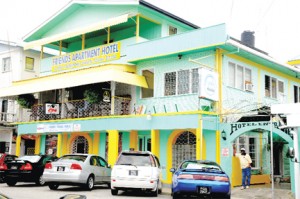The owners of yet another city hotel have confirmed that their business is “up for sale” and that they are keen to close a deal as early as possible.
Victor and Joan Green, owners of the 14-room Friends Hotel on Robb Street, have confirmed to Stabroek Business that they are looking for a buyer for the business which they started as the popular Green Shrimp nightspot in 1971 and which became Friends Hotel in 1976.

News that yet another local hotel is on the market provides further evidence of a continuing decline in a sector that depends largely on steadily shrinking tourist arrivals.
Earlier this week it was announced that the Hotel Tower, one of the city’s oldest hotels had been sold to a local business consortium for US$3M while it is widely known that the Pegasus, Guyana’s premier hotel is also on the market. Recently, the resort, Shanklands on the Essequibo River, also began looking for a buyer while several other businesses in the hotel and tourism sector including the Zoom Inn Hotel are also on the market. Five-star aspirant Buddy’s International also changed hands after just a year in operation and the popular creek-side resort Splashmins is also on the market.
The Greens told Stabroek Business that a point had long been reached where occupancy rates could not cover maintenance costs and that they were looking to get out of the business as fast as possible, The Greens disclosed that they had already had discussions with some potential local buyers and that they were currently awaiting the arrival here of a potential investor from the United Kingdom,
Meanwhile, the Greens told this newspaper that “the absence of any real night life” was a disincentive to visitor arrivals and, by extension, to hotel occupancy rates. Other factors including high electricity costs continued to impact seriously on the profitability of the sector, the Greens said.
They told Stabroek Business that they are currently involved in a query with the Guyana Power and Light company over a billing issue that has left them with a $300,000 electricity bill which may have been computed by GPL without any supporting meter reading.
The Greens’ observations about low occupancy rates and high overheads including, particularly, high electricity rates mirror the reasons that have been given by other proprietors for the sluggishness of the sector.
Stabroek Business has been experiencing some difficulty in persuading proprietors in the hotel and hospitality sectors to speak publicly about the challenges facing their operations and sources close to the state-run Guyana Tourism Authority (GTA) have pointed to evidence that these businesses are indeed prepared to “suck up” their tough times rather than to “talk down” a sector which the Tourism Ministry has been doing its best to ‘sell’ as a continuing success. When Stabroek Business spoke with Private Sector Commission Chairman Captain Gerry Gouveia earlier this week he acknowledged that several properties in the hotel and resort sectors had either been sold or were up for sale but refused to concede that this was an indication that the tourism industry was in serious decline. However, the Greens told Stabroek Business that evidence of difficulties in the sector, based on the available evidence cannot be ignored.
This newspaper has learnt that the GTA continues to experience difficulties in securing data pertaining to occupancy rates and other statistics that can help in the evaluation of the performance of the sector, a circumstance which, an industry source says, suggests that businesses in the sector may not be keen to reveal the extent of the decline.
While there has been little official response to the surfeit of advertisements of properties for sale in the hotel sector here, it is widely known that the hotel sector in other Caribbean territories has been ravaged by the decline in tourist arrivals in the region. Addressing a Brookings Institute forum on the global situation in Washington just over a week ago, Caribbean Community Secretariat Assistant Secretary General Dr. Edward Greene said that fall-offs in regional tourist arrivals and room occupancy rates were as high as two-thirds in some locations. These, according to Dr. Greene, “have implications for tourist-related entertainment industries and complementary services like airline and taxi transportation as well as the construction industry.”
In his presentation Dr. Greene disclosed that between mid last year and February this year the hotel industry in The Bahamas had laid off 1500 workers.
Some local hotels have been reportedly quietly shedding both service and administrative staff in an effort to prepare their businesses for sale.





